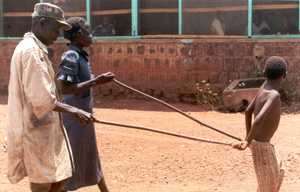The Burden of Onchocerciasis (River Blindness)

A child leading elders blinded by onchocerciasis. Credit: Carter Center.
Onchocerciasis is an infection caused by a worm transmitted from person-to-person by blackflies. One hundredy twenty million people in 37 countries are at risk, with 37 million individuals currently infected (99% of whom live in Africa). The infection causes intense itching, disfiguring skin lesions (called leopard or lizard skin), and eye disease that can result in blindness. Onchocerciasis is the world’s fourth leading cause of preventable blindness.
Treatment with a drug called ivermectin (donated by Merck and Co., Inc), combined with the spraying of areas where black flies lay eggs with environmentally safe insecticides has been found to be the most effective method of control for onchocerciasis. A single dose of a drug given once a year can prevent infection, and treats eye and skin disease. Substantial progress has been made in the Americas towards regional elimination of onchocerciasis.
More on: Onchocerciasis
References
- World Health Organization. Neglected Tropical Diseases, hidden successes, emerging opportunites. 2009
- Basáñez MG et al. River blindness: A success story under threat? PLoS Med. 2006 September; 3(9): e371.
- Benton B. Economic impact of onchocerciasis control through the African Programme for Onchocerciasis Control: an overview. Ann Trop Med Parasitol. 1998 Apr;92 Suppl 1:S33-9.
- Cupp EW, Cupp MS. Short report: impact of ivermectin community-level treatments on elimination of adult Onchocerca volvulus when individuals receive multiple treatments per year. Am J Trop Med Hyg. 2005 Dec;73(6):1159-61.
- Cupp EW, Sauerbrey M, Richards F. Elimination of human onchocerciasis: History of progress and current feasibility using ivermectin (Mectizan(®)) monotherapy. Acta Trop. 2010 Aug 27. [Epub ahead of print]
- Lindblade K et al. Elimination of Onchocercia volvulus transmission in the Santa Rosa focus of Guatemala. Am. J. Trop. Med. Hy. 2007 77(2):334–41.
- World Health Organization. Report from the 2009 InterAmerican Conference on Onchocerciasis: progress towards eliminating river blindness in the Region of the Americas. Wkly Epidemiol Rec. 2010 Aug 13;33(85):321–8.
- Page last reviewed: August 3, 2017
- Page last updated: August 9, 2017
- Content source:


 ShareCompartir
ShareCompartir